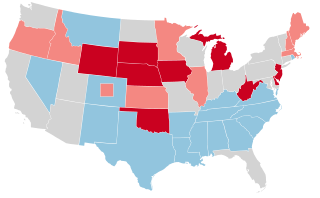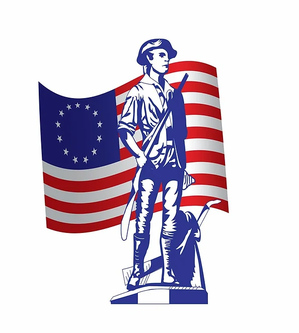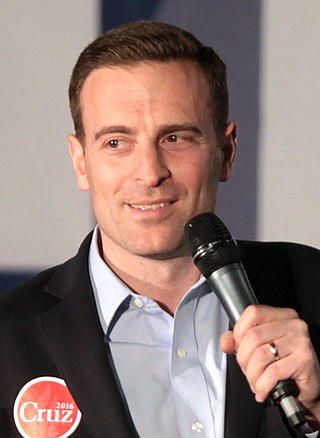
The Conservative Party of New York State is an American political party founded in 1962 following conservative dissatisfaction with the Republican Party in New York. Running on the Conservative Party line, James L. Buckley won election to the U.S. Senate in 1970 and served for one term. Since 2010, the party has held "Row C" on New York ballots—the third-place ballot position, directly below the Democratic and Republican parties—because it received the third-highest number of votes of any political party in the 2010, 2014, 2018, and 2022 New York gubernatorial elections. The party is known for its strategy of attempting to influence the Republican Party in a more conservative direction.

The 1974 United States Senate elections were held on November 5, with the 34 seats of Class 3 contested in regular elections. They occurred in the wake of the Watergate scandal, Richard M. Nixon's resignation from the presidency, and Gerald Ford's subsequent pardon of Nixon. Economic issues, specifically inflation and stagnation, were also a factor that contributed to Republican losses. As an immediate result of the November 1974 elections, Democrats made a net gain of three seats from the Republicans, as they defeated Republican incumbents in Colorado and Kentucky and picked up open seats in Florida and Vermont, while Republicans won the open seat in Nevada. Following the elections, at the beginning of the 94th U.S. Congress, the Democratic caucus controlled 60 seats, and the Republican caucus controlled 38 seats.

The 1964 United States Senate elections were held on November 3. The 33 seats of Class 1 were contested in regular elections. Special elections were also held to fill vacancies. They coincided with the election of President Lyndon B. Johnson by an overwhelming majority, to a full term. His Democratic Party picked up a net two seats from the Republicans. As of 2023, this was the last time either party has had a two-thirds majority in the Senate, which allowed the Senate Democrats to override a veto, propose constitutional amendments, or convict and expel certain officials without any votes from Senate Republicans. However, internal divisions would have prevented the Democrats from having done so. The Senate election cycle coincided with Democratic gains in the House in the same year.

The 1942 United States Senate elections were held November 3, 1942, midway through Franklin D. Roosevelt's third term as president. The 32 seats of Class 2 were contested in regular elections, and two special elections were held to fill vacancies.

United States gubernatorial elections were held on November 7, 2006, in 36 states and two territories. The elections coincided with the midterm elections of the United States Senate and the United States House of Representatives.

The 2006 United States Senate election in Nevada was held on November 7, 2006. Incumbent Republican John Ensign defeated Democratic nominee Jack Carter to win re-election to a second term. This election was the only Senate election in Nevada where the incumbent Republican Senator was re-elected or won re-election since 1980 and the only Senate election in Nevada for this seat where the incumbent Republican Senator was re-elected or won re-election since 1952.

United States gubernatorial elections were held on November 5, 2002, in 36 states and two territories. The Republicans won eight seats previously held by the Democrats, as well as the seat previously held by Minnesota governor Jesse Ventura, who was elected on the Reform Party ticket but had since renounced his party affiliation. The Democrats won 10 seats previously held by the Republicans, as well as the seat previously held by Maine governor Angus King, an independent. The elections were held concurrently with the other United States elections of 2002.

The Independent American Party of Nevada (IAPN) is a right-wing American political party and the Nevada affiliate of the Constitution Party. The party was founded in 1967 and affiliated with the Constitution Party after its forming in 1999. It was one of four Constitution state parties that did not change their names to "Constitution Party".
Sue Ellen Wagner is an American politician. She was the 30th lieutenant governor of Nevada, serving from 1991 to 1995, the first woman to be elected to the position. A moderate who was liberal on social issues, she was a member of the Republican Party until her exit in January 2014 due to the party's shift towards the Tea Party movement.

The 1974 New York state election was held on November 5, 1974, to elect the governor, the lieutenant governor, the state comptroller, the attorney general, two judges of the New York Court of Appeals and a U.S. Senator, as well as all members of the New York State Assembly and the New York State Senate.

The 2014 Nevada gubernatorial election was held on Tuesday, November 4, 2014, to elect the Governor of Nevada. Incumbent Republican governor Brian Sandoval won re-election to a second term in office, defeating Democratic nominee Bob Goodman in a landslide. Sandoval won a higher percentage of the vote than any other incumbent governor in 2014.

The Nevada general election, 2014 was held on Tuesday, November 4, 2014, throughout Nevada.

Adam Paul Laxalt is an American attorney and politician who served as the 33rd Nevada Attorney General from 2015 to 2019. A member of the Republican Party, he was the party's unsuccessful nominee for governor of Nevada in 2018 and for the U.S. Senate in 2022.

United States gubernatorial elections were held on November 6, 2018, in 36 states and three territories. These elections formed part of the 2018 United States elections. Other coinciding elections were the 2018 United States Senate elections and the 2018 United States House of Representatives elections.

The 2018 Nevada gubernatorial election took place on November 6, 2018, to elect the next governor of Nevada. Incumbent Republican governor Brian Sandoval was ineligible to run for re-election due to the absolute two-term limit established by the Nevada Constitution. Nevada is one of eight U.S. states that prohibits its governors or any other state and territorial executive branch officials from serving more than two terms, even if they are nonconsecutive.

The Nevada general election, 2018 was held on Tuesday, November 6, 2018, throughout Nevada.

The 1976 United States presidential election in Nevada took place on November 2, 1976, as part of the 1976 United States presidential election. Voters chose three representatives, or electors, to the Electoral College, who voted for president and vice president.

United States gubernatorial elections were held on November 8, 2022, in 36 states and three territories. As most governors serve four-year terms, the last regular gubernatorial elections for all but two of the seats took place in 2018. The gubernatorial elections took place concurrently with several other federal, state, and local elections, as part of the 2022 midterm elections.

The 2022 Nevada gubernatorial election took place on November 8, 2022, to elect the governor of Nevada. Incumbent Democratic governor Steve Sisolak lost re-election to a second term, being defeated by Republican nominee, Clark County Sheriff, Joe Lombardo.

The 2018 Nevada Attorney General election took place on November 6, 2018, to elect the attorney general of Nevada.





















